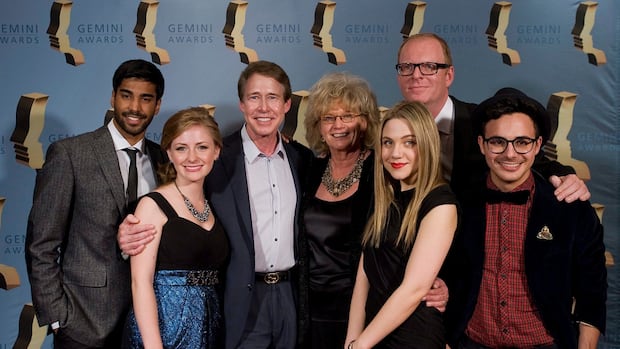Bob Ezrin’s resumé is as impressive as it is diverse. Over his five-decade career, the legendary Canadian music producer has worked with dozens of artists, from Alice Cooper and Jane’s Addiction to Taylor Swift and Andrea Bocelli.
“Most people don’t understand what I do for a living,” he told CBC’s Ian Hanomansing in a wide-ranging interview.
“You’re dealing with extremely talented, often very high-strung people or complicated people, and you’re trying to get the best performance out of them you possibly can on every level.”
For Ezrin, that work has included concept development, co-writing, arranging and sound design. But it has also required getting more intimate with a band, with Ezrin often playing the role of psychologist, confessor or protector — sometimes all in one day.
That work often came at a personal cost — from being individually called out in reviews to a falling-out with an “apoplectic” Roger Waters — but his collaborations have helped create genre-defining releases, like KISS’s slick Destroyer from 1976 and Pink Floyd’s transcendental 1979 concept album The Wall.
Now, as he celebrates receiving a Governor General Arts Award for Lifetime Achievement, the 76-year-old musical icon reflected on everything from recording with Pink Floyd to reworking KISS’s sound — and why he decided to renounce his U.S. citizenship.
Legendary music producer Bob Ezrin says the role of the music producer is very similar to the role of a director on a film, pushing to get the best out of talent.
Inside the recording process for The Wall
One of Ezrin’s career highlights came while recording The Wall. He fondly remembers working with guitarist David Gilmour when he played the iconic first solo on Comfortably Numb, one of the band’s most iconic songs.
Gilmour’s two solos on the track are consistently regarded as some of the best of all time. Ezrin says he recognized the power of that first solo as soon as Gilmour started playing along with the track.
“I did get tears in my eyes. It just blew me away,” he said. “Like, it’s so majestic and so melodically perfect and so serves the story, you know, in a way that just regular orchestration or other things like that could never have done.”
Music producer Bob Ezrin recounts getting tears in his eyes the moment he first heard Pink Floyd’s David Gilmour play the iconic Comfortably Numb guitar solo.
That moment of perfection came during a famously acrimonious period for Pink Floyd.
Main lyricist Waters had started to assert his primacy within the band, Ezrin said. The project was based on Waters’s life, so he had a deep, proprietary feeling about it, and was at first resistant to input from the others.
‘No points for Ezrin’
Even with the tension, Ezrin says there were some good times — “laughter, kibitzing, messing around” — as well as some schoolyard bullying.
“There was a lot of picking on me,” said Ezrin. “One day I showed up after we had taken a break and everybody had ‘NOPE’ buttons, N-O-P-E. And what it stood for was ‘No Points for Ezrin.'” (Points meaning royalties for the album sales.)
“I didn’t think it was that serious, and later on I found out that they were more serious than I thought,” said Ezrin, who noted that in the end he did get paid for the project.

When the album wrapped, Waters and Ezrin had a major falling-out, after Ezrin inadvertently gave away some secrets about The Wall tour to a Billboard journalist.
“Roger went absolutely nuclear, apoplectic,” said Ezrin. “And he had every right to.”
The relationship between the two men has never fully recovered, and the rift may have deepened in recent years, with Ezrin even regretting parts of The Wall.
“There are some parts … I wish I hadn’t done,” he said, calling elements of the album “almost neo-fascistic.”

The album includes fascist imagery to portray the protagonist’s downward spiral, as he eventually hallucinates being a neo-Nazi leader. Ezrin says he used to think the references were done satirically, but he now believes Waters wasn’t joking.
“He wasn’t kidding. He really wasn’t kidding about some of that stuff,” Ezrin said.
In recent years, Waters has been accused of repeated antisemitism, with witnesses claiming to have heard him make derogatory references to Jews. He has publicly denied being antisemitic, and has repeatedly said that The Wall is anti-fascist.
Tweaking an iconic band’s image
While Ezrin’s production is primarily well regarded by fans and peers, critical reception hasn’t always been positive. He laughs when he recalls the first time he worked with the band KISS, on their fourth studio album, Destroyer.
“The first review for Destroyer was just devastating,” he said. “And in fact the reviewer said something like, ‘I’ve got a mind to go up to Toronto and punch Bob Ezrin in the nose on behalf of KISS fans everywhere.'”
This sort of thing used to happen because he was often hired to change the direction of a musical act, he said.
Music producer Bob Ezrin says he used Marlin Brando’s film The Wild One to convince KISS to soften their image a little for the 1976 album, Destroyer.
For KISS, Ezrin was brought in to try and broaden their audience, which he said at the time was largely “15-year-old pimply boys.”
He told the band they needed to show a more vulnerable side to generate interest from “the girls of America.”

That included reworking the song Beth, changing it from what he called a “screw-you” kind of song to a “gentle, sweet” ballad that was almost lullaby-like, adding in a piano melody and a walking bass line.
He also worked to make the overall sound more polished than the band’s earlier albums.
It was a huge departure for KISS. And while the alterations did anger some die-hard fans, the plan worked. Destroyer became the first KISS album to be certified platinum.
Returning home to Canada
Ezrin says he is grateful to be recognized with the Governor General’s Award. It coincides with a major move for him — he announced in February he’d be renouncing his U.S. citizenship and returning to Toronto, after four decades of living in the States. The political climate had become too polarized, he said.
Several months in, he says he’s comfortable with his decision. As for what his American friends think, he joked, “Many of them want to be adopted.”
Music producer Bob Ezrin tells The National’s Ian Hamomansing how his American friends reacted to his decision to renounce his U.S. citizenship and return to Canada.
Now, at 76, he continues to work. He recently finished an album with the original Alice Cooper Band, and he is wrapping up a project with the English rock band Deep Purple.
“Sometimes I have to sort of pinch myself. Because I just do what I do,” he said. “But I really appreciate the recognition and I appreciate being appreciated.
“It just fills me with a warm feeling of belonging … to this culture, this country.”







